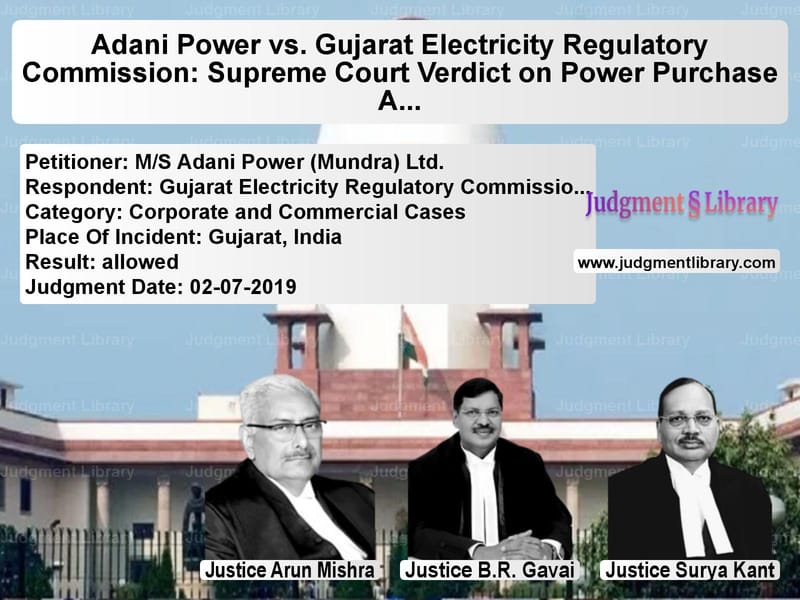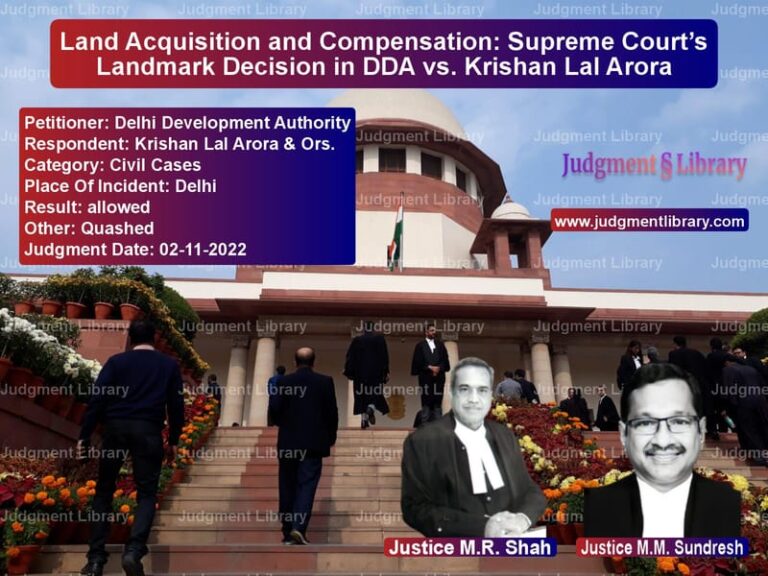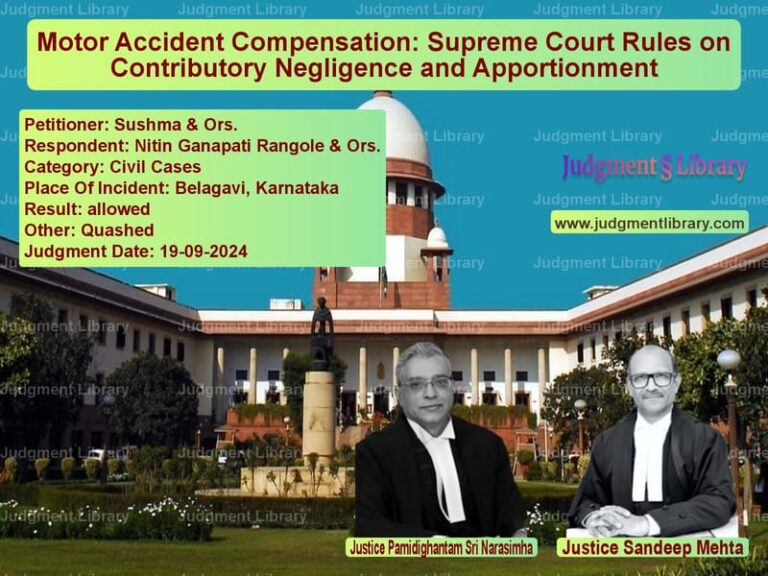Adani Power vs. Gujarat Electricity Regulatory Commission: Supreme Court Verdict on Power Purchase Agreement Dispute
The case of M/S Adani Power (Mundra) Ltd. v. Gujarat Electricity Regulatory Commission & Ors. is a landmark dispute regarding the termination of a Power Purchase Agreement (PPA) and the obligations of parties under competitive bidding contracts in the power sector. The Supreme Court had to determine whether Adani Power was justified in terminating the PPA due to the non-availability of coal from Gujarat Mineral Development Corporation (GMDC) and whether the Gujarat Electricity Regulatory Commission (GERC) erred in directing the supply of power under the disputed agreement.
Background of the Case
The dispute originated from a competitive bidding process under Section 63 of the Electricity Act, 2003. Adani Power submitted a bid to supply 1000 MW of power to Gujarat Urja Vikas Nigam Ltd. (GUVNL), quoting Rs. 2.35 per kWh. The bid was based on a specific assumption that GMDC would supply coal from the Naini coal block.
After winning the bid, Adani Power entered into a PPA with GUVNL on 2 February 2007. The agreement contained clauses specifying that Adani Power would secure coal from GMDC and that the supply of power was dependent on the availability of this coal.
However, GMDC failed to secure the necessary approvals and was unable to supply coal to Adani Power. Consequently, Adani Power issued a notice of termination of the PPA under Clause 3.4.2 of the agreement, which allowed termination if the necessary conditions were not met. GUVNL challenged this termination before GERC, arguing that the contract was not contingent upon the specific coal supply from GMDC.
Proceedings Before the Regulatory Authorities and Tribunals
GUVNL filed a petition before the Gujarat Electricity Regulatory Commission (GERC) seeking enforcement of the PPA, contending that Adani Power was obligated to supply power regardless of the non-availability of coal from GMDC.
The key findings of GERC were:
- Adani Power was contractually bound to supply power at Rs. 2.35 per kWh, irrespective of fuel availability.
- The PPA did not explicitly state that power supply was conditional upon GMDC’s coal supply.
- Adani Power could procure coal from other sources, including e-auctions, and meet its contractual obligations.
Based on these observations, GERC directed Adani Power to supply power at the originally agreed tariff. Aggrieved by this order, Adani Power approached the Appellate Tribunal for Electricity (APTEL).
APTEL, in its ruling, upheld GERC’s order and reiterated that Adani Power could not unilaterally terminate the contract on the basis of non-availability of a specific coal source.
Petitioner’s Arguments
Adani Power, challenging the rulings of GERC and APTEL, contended before the Supreme Court that:
- The bid was submitted based on the assumption that coal would be supplied by GMDC, and this was a fundamental condition of the PPA.
- Clause 3.4.2 of the PPA allowed termination if the necessary conditions were not fulfilled.
- The doctrine of frustration under Section 56 of the Indian Contract Act, 1872 applied, making performance of the contract impossible.
- APTEL erred in treating the contract as unconditional, disregarding the contractual clauses specifying coal supply as a prerequisite.
Respondent’s Arguments
GUVNL, defending the decisions of GERC and APTEL, argued:
- Adani Power was fully aware of the risks associated with coal supply and had no contractual basis to terminate the PPA.
- The contract did not state that non-availability of GMDC coal would absolve Adani Power of its obligations.
- The company had access to alternative coal supply sources and could not use non-availability of coal as an excuse to evade contractual performance.
- Allowing termination would set a negative precedent, enabling power producers to abandon contracts whenever fuel supply issues arose.
Supreme Court’s Observations
The Supreme Court carefully examined the contractual terms and regulatory framework, making the following key observations:
- The PPA explicitly mentioned GMDC coal as a source, and Adani Power’s bid was predicated on this understanding.
- The inability of GMDC to supply coal was a fundamental failure that justified Adani Power’s termination under Clause 3.4.2.
- Electricity contracts are distinct from ordinary commercial contracts and must consider factors such as fuel supply dependency.
- The lower forums erred in treating the PPA as unconditional when the agreement clearly linked power supply to coal availability.
The Court noted:
“A contract must be interpreted based on the intention of the parties at the time of execution. Where performance is contingent upon an external condition—such as coal supply—the non-fulfillment of that condition enables a party to lawfully exit the contract.”
Final Judgment
The Supreme Court ruled in favor of Adani Power, holding that:
- The termination of the PPA was valid under Clause 3.4.2.
- GUVNL’s petition before GERC should have been dismissed as Adani Power acted within its contractual rights.
- The compensatory tariff for electricity supplied post-termination should be determined by the Central Electricity Regulatory Commission (CERC).
- The regulatory authorities and lower courts had erred in directing Adani Power to supply power at a tariff that was rendered unviable due to non-availability of fuel.
The Court directed CERC to determine the compensatory tariff and ordered GUVNL to make payments accordingly.
Impact of the Judgment
This ruling sets an important precedent in power sector disputes:
- It affirms the principle that contracts must be interpreted based on their express terms and conditions.
- It clarifies that termination clauses in PPAs are enforceable when fundamental conditions are not met.
- It recognizes the dependency of power supply contracts on fuel availability.
- It prevents regulatory overreach that forces private players into unviable contracts.
Conclusion
The Supreme Court’s judgment in this case ensures that contractual obligations in the power sector are upheld in a manner that respects the realities of fuel supply constraints. By allowing Adani Power to terminate the PPA lawfully, the ruling protects power producers from undue liabilities and establishes legal certainty in commercial agreements. This decision serves as a guiding principle for future disputes involving electricity contracts and regulatory intervention.
Petitioner Name: M/S Adani Power (Mundra) Ltd..Respondent Name: Gujarat Electricity Regulatory Commission and Others.Judgment By: Justice Arun Mishra, Justice B.R. Gavai, Justice Surya Kant.Place Of Incident: Gujarat, India.Judgment Date: 02-07-2019.
Don’t miss out on the full details! Download the complete judgment in PDF format below and gain valuable insights instantly!
Download Judgment: MS Adani Power (Mun vs Gujarat Electricity Supreme Court of India Judgment Dated 02-07-2019.pdf
Direct Downlaod Judgment: Direct downlaod this Judgment
See all petitions in Contract Disputes
See all petitions in Company Law
See all petitions in unfair trade practices
See all petitions in Corporate Compliance
See all petitions in Bankruptcy and Insolvency
See all petitions in Judgment by Arun Mishra
See all petitions in Judgment by B R Gavai
See all petitions in Judgment by Surya Kant
See all petitions in allowed
See all petitions in supreme court of India judgments July 2019
See all petitions in 2019 judgments
See all posts in Corporate and Commercial Cases Category
See all allowed petitions in Corporate and Commercial Cases Category
See all Dismissed petitions in Corporate and Commercial Cases Category
See all partially allowed petitions in Corporate and Commercial Cases Category







